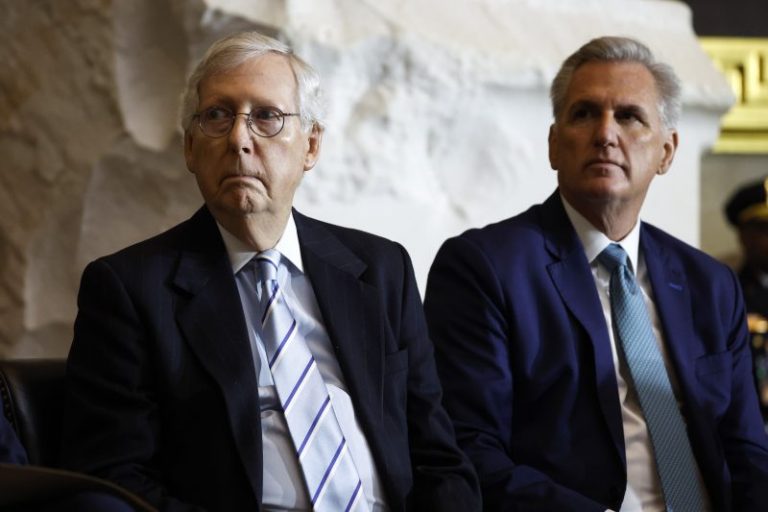Two leaders of the Republican Party made history on Tuesday. Senate Minority Leader Mitch McConnell (R-Ky.) became the longest-serving party leader in the history of the U.S. Senate. And, on the other side of the Capitol, Rep. Kevin McCarthy (R-Calif.) became the first party leader in a century to fail to obtain a majority of cast votes for speaker in the first round of voting for that position.
These diverging fates are in part a reflection of the status of the GOP on Capitol Hill — the minority in the Senate and a new majority in the House. But they are also a reflection of the fact that the top leadership position in the House is categorically different than that in the Senate, and a much tougher one to secure.
In the 11 speaker votes before Tuesday’s, the nominated leader of the majority party secured enough loyalty from their party to immediately win most of the votes cast. That hasn’t always been 218 votes; a candidate for speaker needs only to win a majority of the votes cast for specific people. But that has been a benchmark that every candidate for the position has hit over the past two decades (and the last century, for that matter). As long as the red or blue segments of the charts below cross that dotted black line, the speaker race is over.
McCarthy didn’t get there.
The reason for this is simple. As The Washington Post’s Matthew Brown wrote on Tuesday, the speaker position is unique in Congress, sitting outside partisan alignment. It is a leader for the entire body, with few constitutional boundaries in place. As is now commonly known, the speaker need not even be a member of the House. But parties exist to preserve party power, so recent speaker votes have fallen largely along party lines with leaders ensuring that the majority-vote threshold can be met. There have been defections, but ones generally orchestrated to ensure the vote target would nonetheless be met.
McCarthy’s disadvantaged in two ways. The first is that his party’s majority is remarkably narrow, meaning that even a small number of defections threatened to upend the math. The second is that he’s seeking the GOP’s leadership position at a moment of deep divisiveness within his party — a moment when several members of his caucus see more value in allying with a right-wing media ecosystem than with a party leadership that at times is forced to negotiate toward the middle.
So, after multiple rounds of voting, McCarthy came up short. As of this writing, it is unclear what outcome might result.
Remember, though, that McCarthy won a vote in mid-November that positioned him as the leader of the Republican caucus. The results of that vote now seem telling: He saw 31 members of his caucus vote for someone else for his position. In the first two votes for speaker, there were 19 similar defections.
McConnell was actually reelected as the head of the Senate Republican caucus by a smaller percentage! He saw an unusual leadership challenge that same month from Sen. Rick Scott (R-Fla.). McConnell won 79 percent of votes cast; McCarthy won 86 percent. But since McConnell only needed that approval from his caucus, it was enough. Were he seeking a speaker-like position in the Senate, he’d have secured only 37 percent of the entire chamber’s support. McCarthy, by contrast, obtained 47 percent of all votes cast in the House. Nearly everyone in his caucus, but not enough.
There is an alternate universe in which the GOP didn’t win that narrow House majority. In that universe, McCarthy and McConnell are on relative similar terrain: each needing only a majority of their caucus’s support to retain leadership and each obtaining it. McConnell has other long-term advantages, of course. The nature of the Senate is such that there’s less turnover and less dependence on the whims of things like what conservative media is worried about. McCarthy has the unenviable and demonstrably more difficult task of keeping House Republicans in line.
That also makes it much harder to secure a position that depends on party unanimity. So McCarthy’s Tuesday may end with political humiliation as McConnell’s ends in celebration.

